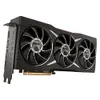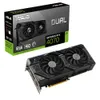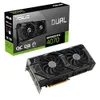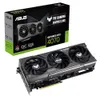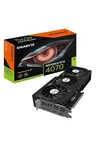GeForce RTX 4070 vs Radeon RX 6950 XT: Which GPU Is Better?
Nvidia's new GPU takes on AMD's previous generation king.
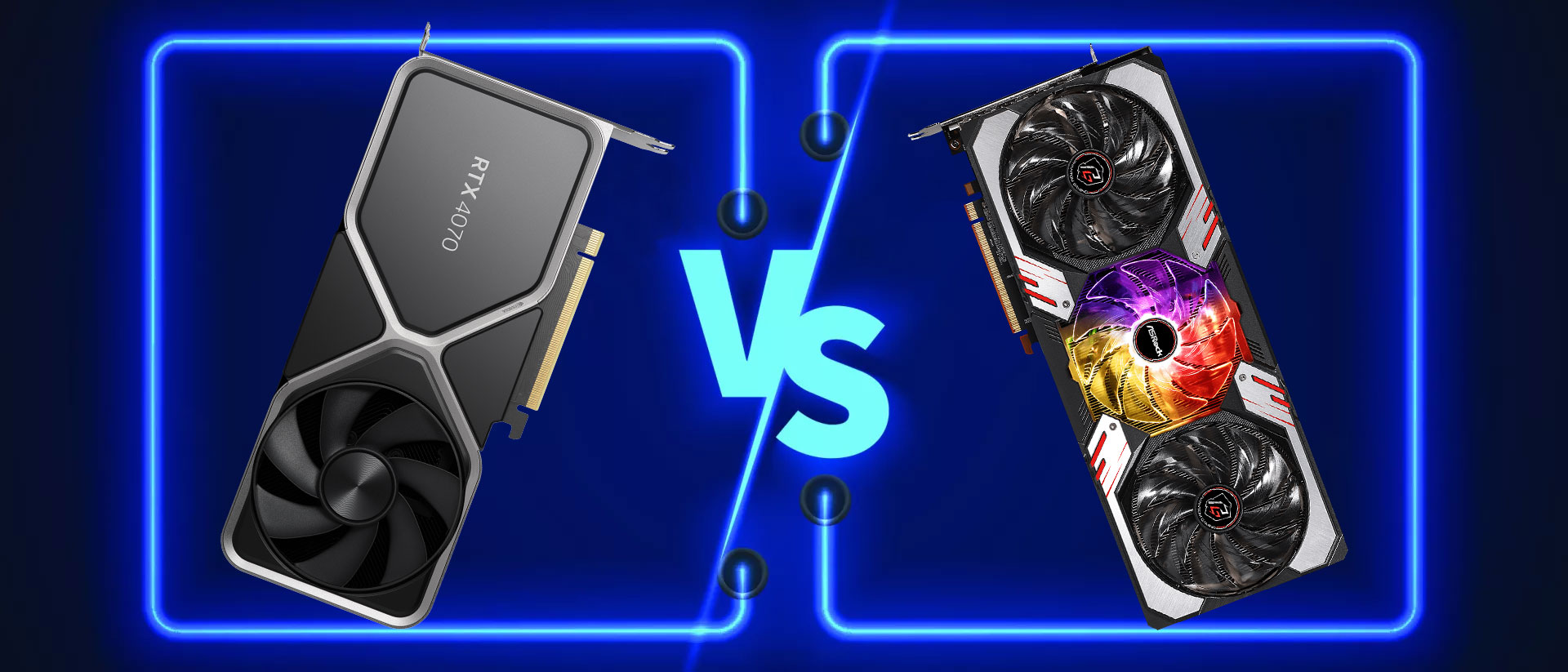
Nvidia just launched its fourth Ada Lovelace GPU, the GeForce RTX 4070, which finally brings the latest generation hardware down into the realm of affordability for many gamers. It's still $599, but that's better than the $799 and higher we've of the earlier RTX 40-series GPUs. AMD for its part has no direct current contender, opting instead to encourage price reductions on its existing line of RDNA 2 GPUs like the RX 6950 XT.
The RTX 4070 is now on our list of the best graphics cards, and the RX 6950 XT and other Navi 21 variants have been there on and off over the past couple of years. Today, both rank in the upper portion of our GPU benchmarks hierarchy. But there's more to this than gaming performance, so let's put them both in a cage and see which one can emerge victorious from the Thunderdome.
For this GPU face off, we'll look at how the two cards stack up in terms of performance, price, features and tech, drivers and software, and power and efficiency. Then we'll declare a winner, because this isn't soccer and ties aren't allowed. Those categories are listed in order of decreasing importance, in our view at least, so we'll start with the critical aspects and move on down the list from there.
Performance: RTX 4070 vs RX 6950 XT
Graphics cards and GPUs are used for many tasks, including video editing, AI, streaming, and more. Still, gaming is the major reason most people are looking for a new graphics card. While $599 isn't necessarily an extreme amount of money to spend, it's also more than the latest generation consoles and people buying high-end cards expect top-notch performance. We ran the RTX 4070 and RX 6950 XT through our 15-game test suite, including testing at 1080p, 1440p, and 4K, to see which comes out on top.
These are high-end cards, so focusing on the 1440p performance makes the most sense — they're more than fast enough for 1080p but at the same time not usually potent enough for 4K at maxed out settings. Across our suite of games, the two GPUs trade blows. AMD's RX 6950 XT clearly wins in the rasterization performance bracket, with Total War: Warhammer 3 being the only game to give the RTX 4070 a win at 1440p. There are also outliers like Borderlands 3 where AMD has a massive 35% lead (it's an AMD promoted game, naturally). Overall, the RX 6950 XT comes out 14% ahead of the RTX 4070 in rasterization, and that grows to 17% at 4K (but shrinks to 8% at 1080p).
The reverse takes place when we turn to the ray tracing benchmarks. There, the RTX 4070 leads by 21% on average at 1440p… except neither GPU really provides a great gaming experience at 1440p native with ray tracing. Dropping to 1080p actually increases the leads by a few percent, while at 4K the lead shrinks to 20%.
But while we just said 1440p with ray tracing isn't a great experience, we need to talk about DLSS and FSR2 upscaling. Both generally provide similar gains at a given resolution, at least in fps, but DLSS continues to get more support than FSR2. At present, AMD lists 120 games with FSR2 support (79 are currently available), while Nvidia lists 280 games with DLSS 2 upscaling support. Of those, 46 of the games support both DLSS2 and FSR2.
Nvidia also has another 33 games with DLSS 3 support, and while we don't think Frame Generation is a universally perfect solution and is being heavily used for marketing purposes, it's still potentially useful. We generally find the performance increase in terms of frames delivered to the screen doesn't usually correspond directly with how much faster a game feels, but a 50% boost to fps typically feels 10–20 percent smoother.
Overall, roughly three times as many games support DLSS 2 as FSR 2 — and note that all of the DXR games and six of the nine rasterization games in our test suite support DLSS, while FSR2 is only supported in two of the DXR games and three of the rasterization games. In each of those games Nvidia's RTX 4070 will get about a 30–50 percent boost to performance, using Quality mode upscaling. That means a game will typically run significantly faster than AMD's RX 6950 XT if a game only supports DLSS and not FSR2
The same is true for games that support only FSR2 but not DLSS. But exclusive DLSS support is about seven times more likely than exclusive FSR2 support. Currently 234 games support DLSS and not FSR2, while only 33 support FSR2 but not DLSS — though many of the games on both lists are relatively unknown.
Is it fair to compare upscaled to native performance? That's debatable, but we think upscaling is here to stay, and frankly the performance gains of even Quality mode upscaling easily outweigh the potential loss of visual fidelity.
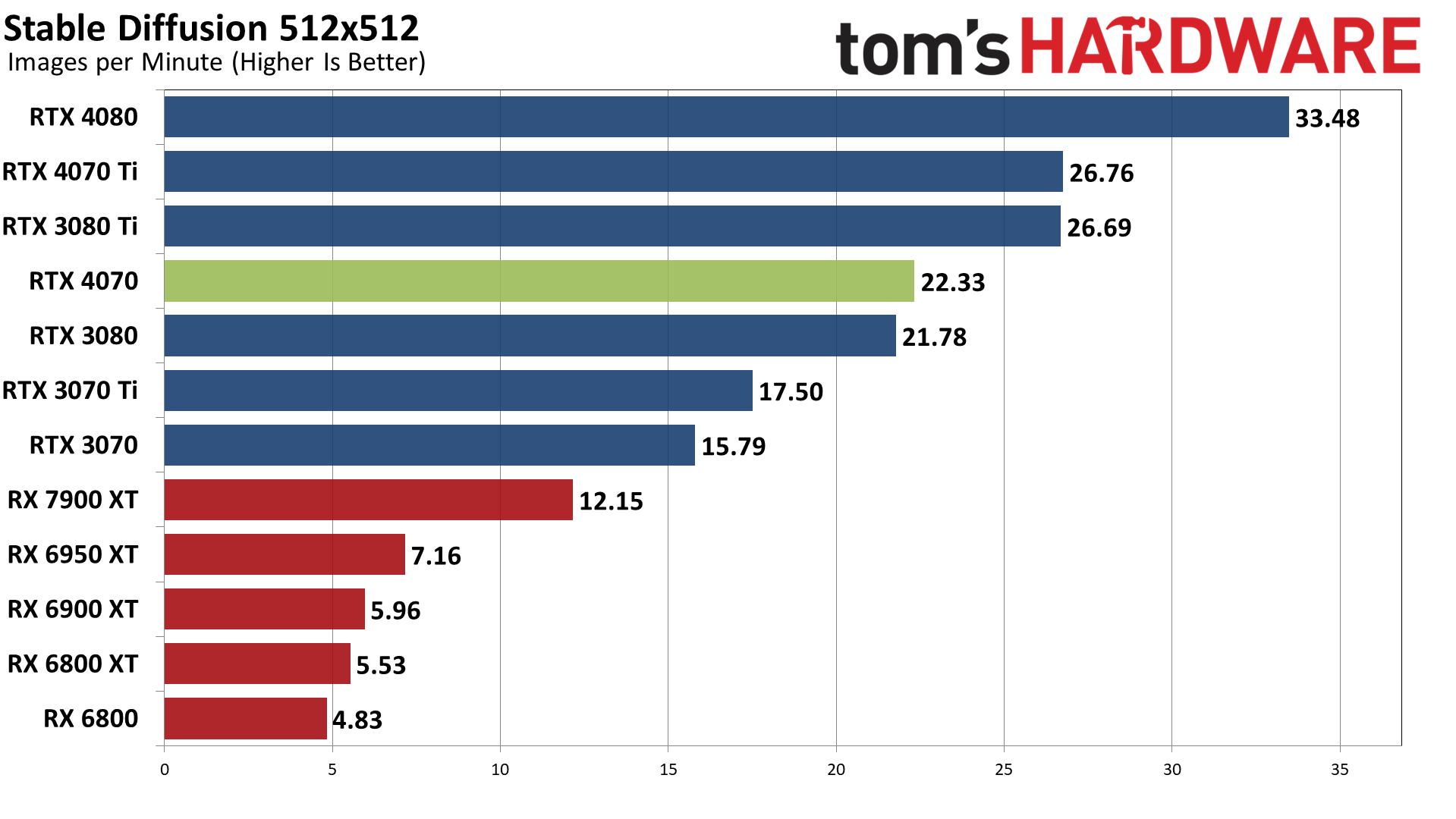
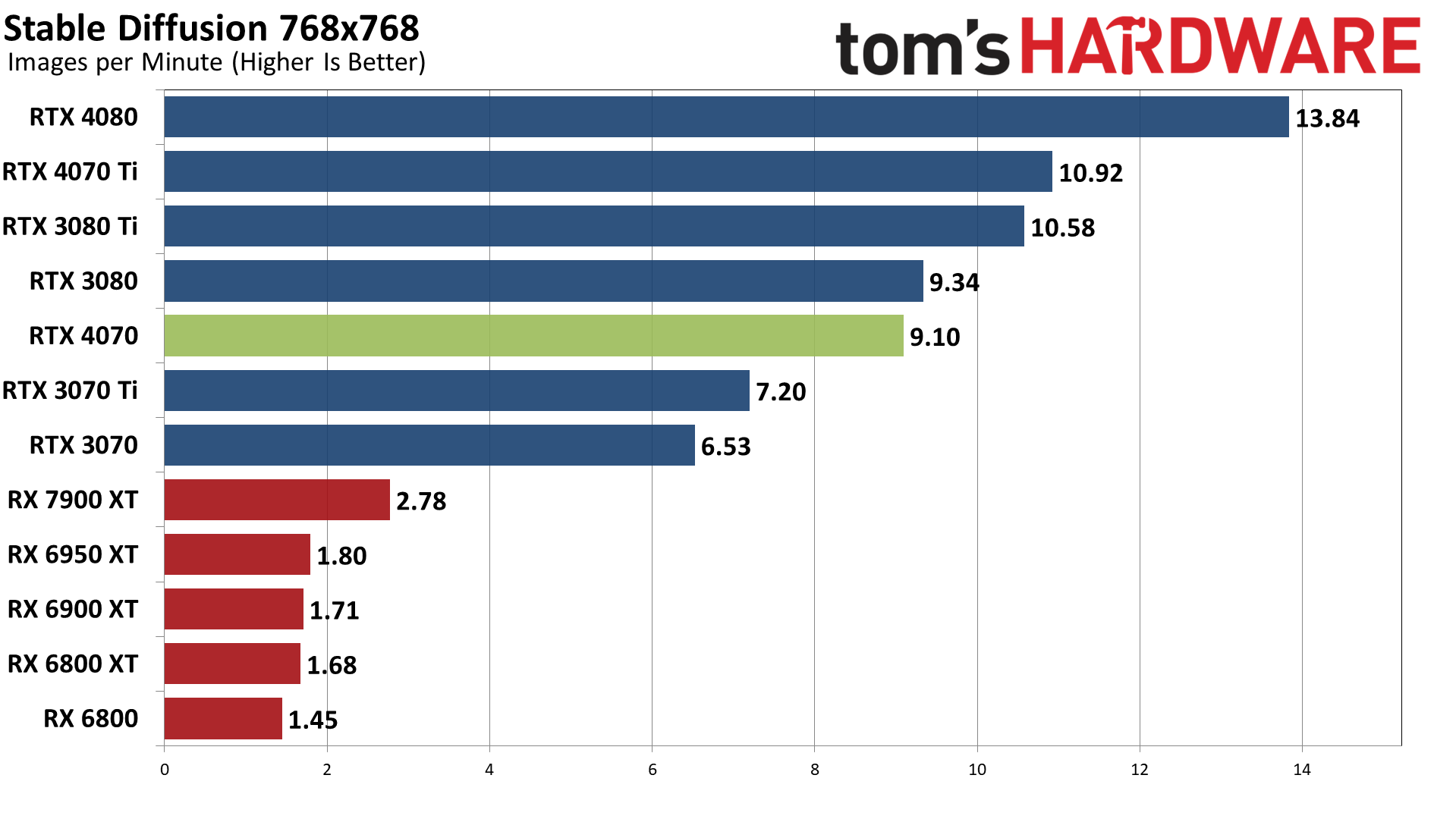
Outside of gaming performance, the Nvidia RTX 4070 offers substantially better support for AI workloads, plus it's substantially faster at AI projects like Stable Diffusion where both GPUs can at least run the task. In our most recent testing, the RTX 4070 was nearly twice as fast as the RX 6950 XT in Stable Diffusion 512x512 images, and over three times as fast for 768x768 image generation. That doesn't even account for being unable to get AI Text Generation and many other AI projects working on AMD GPUs (at least not without recoding portions of the project).
Winner: Nvidia RTX 4070
While both cards are plenty fast for most games, it's in the games that tend to be more demanding that Nvidia pulls ahead. This will be a controversial pick, as the RX 6950 XT is almost always faster in rasterization games. It's typically about 15% faster on average, but that's often in games hitting well over 60 fps. In the games where it's slower, however (like nearly all the DXR games), the RTX 4070 with DLSS will typically deliver over 60 fps while the 6950 XT (even if FSR2 support is available) will come up short of that mark.
We're surprised by how many gamers still look down on upscaling as a sort of crutch. Personally, I almost always enable Quality mode (whether DLSS2 or FSR2 or even XeSS), just because I like to run at 1440p and 4K and it makes the experience noticeably better. Both the 4070 and 6950 XT are quite fast, as they should be for high-end parts, but if we have to pick a winner, Nvidia gets the edge in overall performance. Again, that's factoring in ray tracing games, DLSS upscaling, and AI workloads. If you have no interest in any of those, AMD's RX 6950 XT comes out ahead, but those are three pretty major topics in the GPU world these days.
Price: RTX 4070 vs RX 6950 XT
It almost feels nice to have a latest generation graphics card priced below $800. Almost. After the 4090, 4080, and 4070 Ti, and without much help from AMD's 7900-series cards, people are still waiting for mainstream and budget upgrades. Depending on your definition of mainstream, $599 might even apply. But either way, right now, there are numerous RTX 4070 cards available for purchase online starting at $599. They're not the fanciest models with extra overclocking, but they'll get the job done.
AMD hasn't officially dropped the price of the RX 6950 XT to $599, at least as far as we're aware — the AMD store lists the reference card at $699 (and it's out of stock). But Newegg, Amazon, and others have regularly had RX 6950 XT cards priced in the $599–$699 range for several months, basically since the RX 7900 XT launched. Will such cards continue to exist, now that the RTX 4070 launch is over? Perhaps until they're all sold, or until a lower tier RX 7800- or 7700-series card comes along with similar performance (and hopefully at a better price).
And that's the problem. One card has an official $599 MSRP and should remain at that price point going forward, the other got a price promotion to hit $599 and those cards seem to have disappeared now. The best we can find is $619 at present. Sure, it's "only" $20 extra, but it's also for roughly equivalent performance across our gaming suite, and again we favor Nvidia's GPU across a larger suite of testing that factors in DLSS and AI.
If you can find an RX 6950 XT for the same price as an RTX 4070, it's worth considering, but that's not a decisive win. And in fact, since you'll also use about 100–150 watts more power while gaming with the RX 6950 XT, depending on how much you play games, the ongoing cost of owning the RX 6950 XT could also be higher.
Winner: Nvidia RTX 4070
This one is a close call, but officially sanctioned pricing beats temporary sale pricing, assuming similar performance. Mostly Nvidia wins by virtue of having a latest generation graphics card actually designed for the $599 price point. AMD will hopefully have something better to compete with the 4070 in the coming months.
| Graphics Card | RTX 4070 | RX 6950 XT |
|---|---|---|
| Architecture | AD104 | Navi 21 |
| Process Technology | TSMC 4N | TSMC N7 |
| Transistors (Billion) | 32 | 26.8 |
| Die size (mm^2) | 294.5 | 519 |
| SMs / CUs | 46 | 80 |
| GPU Cores (Shaders) | 5888 | 5120 |
| Tensor Cores | 184 | N/A |
| Ray Tracing "Cores" | 46 | 80 |
| Boost Clock (MHz) | 2475 | 2310 |
| VRAM Speed (Gbps) | 21 | 18 |
| VRAM (GB) | 12 | 16 |
| VRAM Bus Width | 192 | 256 |
| L2 / Infinity Cache | 36 | 128 |
| ROPs | 64 | 128 |
| TMUs | 184 | 320 |
| TFLOPS FP32 (Boost) | 29.1 | 23.7 |
| TFLOPS FP16 (FP8) | 233 (466) | 47.4 |
| Bandwidth (GBps) | 504 | 576 |
| TBP (watts) | 200 | 335 |
| Launch Date | Apr 2023 | May 2022 |
| Launch Price | $599 | $1,099 |
Features and Technology: RTX 4070 vs RX 6950 XT
Nvidia has a habit of promoting new technologies with every generation of graphics cards. In some cases, the new technology truly enables things that weren't really possible before — ray tracing and higher performance AI/deep learning are good examples of this. Others end up feeling more like marketing and only see limited use. Does anyone remember VXAO and VXGI, which were part of the Nvidia Pascal marketing?
Our perception over the years is that Nvidia is often the first mover on technologies. It was first with G-Sync, first with ray tracing, first with DLSS upscaling, first with Reflex, and first with noise cancelation, for example. AMD often follows with "open" solutions that aim to do the same things as Nvidia's proprietary tech. Sometimes, those open solutions win out — FreeSync is far more available than G-Sync these days, and G-Sync Compatible basically felt like Nvidia recognizing the open solution was sufficient and perhaps better.
There are exceptions to the above as well, like AMD moving to DisplayPort 2.1 with 54Gbps bandwidth while Nvidia stuck with DisplayPort 1.4a. AMD also tends to offer more VRAM at similar price points— the RX 6950 XT (and other Navi 21 GPUs) come with 16GB, while the RTX 4070 only has 12GB. More VRAM isn't always necessary, but having more memory should never be a bad thing (everything else being equal). Infinity Cache was also an AMD move that Nvidia has now effectively mimicked with its larger L2 cache — and it's one of those things that benefits every game.
Even if every attempt at a new technology doesn't end up being used everywhere, Nvidia has been doing more over the past few generations. Ray tracing hardware and features have increased substantially since the RTX 20-series, and the tensor core hardware powering DLSS and AI applications is proving particularly useful these days. Now it has DLSS 3 and Frame Generation, and the uptake for DLSS 3 has been much faster than previous versions. One of the benefits of DLSS 3 is that it also requires the games to support Nvidia Reflex, so owners of other Nvidia GPUs also benefit.
It's not just gaming technology, either. We don't know if the RTX 40-series support for FP8 calculations on the tensor cores will prove important in the future. The AV1 video encoding/decoding support on the other hand is already taking off. AMD and Intel offer AV1 encoding support as well, on their latest generation GPUs, but the 6950 XT is a previous generation part.
A lot of this is because Nvidia has been the dominant player in the GPU space for a long time. It currently has about 75–80 percent GPU market share, which means it's better able to push proprietary technologies. If you don't have an Nvidia GPU, that might suck, but unfortunately it's something Nvidia can get away with.
Winner: Nvidia RTX 4070
Nvidia has newer and better technologies and features, with the lack of DisplayPort 2.1 support being the only major strike against it. Except that's only available with RX 7000-series cards, which means at best AMD's 6950 XT ties the RTX 4070 in connectivity; everywhere else, it's a couple years behind the state of the art for GPUs. It's not that the RX 6950 XT is bad, but it doesn't offer anything tangible over the RTX 4070 other than 4GB more VRAM. That's something, but it's not enough to overcome the improved RT, DLSS, AI, AV1, and the other architectural upgrades available with Ada Lovelace GPUs.
Drivers and Software: RTX 4070 vs RX 6950 XT
AMD and Nvidia release regular driver updates for their GPUs. The number of driver releases from both companies has been quite high over the past year, easily numbering in the dozens. In the past, some have complained about poor drivers from AMD or Nvidia, but having tested GPUs from both companies, it's hard to see much difference. Just about every major game release in the past year has seen Game Ready drivers from both companies — and even Intel is getting in on the action now.
We previously noted that Nvidia drivers were usually WHQL (Windows Hardware Quality Labs) certified, while AMD tended to only do that on maybe a quarter of its drivers. AMD seems to have changed its processes in order to get WHQL certification now, or at least the past several drivers have all been WHQL certified. Not that it really matters, as Microsoft rarely does much in order to test quality other than checking that basic Windows functionality isn't broken. Bugs do slip through the cracks — like AMD's high idle power draw with the past few drivers, if you want an example.
One area where AMD and Nvidia differ quite a bit is in their driver user interfaces. Nvidia splits its GeForce driver options into two applications. Nvidia Control Panel handles the GPU settings, such as resolution, texture filtering, vertical sync, low latency mode, power management, and more. The control panel also handles display configuration settings, such as color, rotation, and multi-display setups. Nvidia GeForce Experience handles game settings, driver updates, and includes game streaming and recording features. To access the GeForce Experience features, you have to log in with an Nvidia user account and solve a captcha or provide a 2FA code.
AMD takes a more streamlined approach with its Radeon Settings app serving as a one-stop-solution for all your Radeon GPU settings and features. It handles driver updates, graphics and video settings, and supports game performance profiles. There's built-in broadcasting software to stream and record your gameplay, overclocking options, and performance metrics logging.
Winner: Tie
Other categories might be close, but this one we simply don't see any truly defining differences. Both AMD and Nvidia deliver generally equivalent experiences, even if there are some nuances in how they're done. You can generally expect at least one or more new drivers from both companies each month, which is more than enough for our needs.
Get Tom's Hardware's best news and in-depth reviews, straight to your inbox.
Power Consumption / Efficiency: RTX 4070 vs RX 6950 XT
Performance, features, technologies, and drivers might be relatively close, and you can certainly argue against our reasoning. However, when it comes to power efficiency and consumption, it's no contest. AMD's RX 6950 XT was the mid-cycle refresh of the top-tier Navi 21 GPU, and to boost performance AMD had to give it more power and higher clocks. The reference design has a 335W TBP (Total Board Power), but many of the third-party cards push much higher. The MSI RX 6950 XT for example would hit 440W! Sapphire's RX 6950 XT wasn't quite so aggressive and 'only' averaged 378W in our gaming test.
That might not sound bad when you think of the RTX 4090 and its 450W rated power consumption, but the RTX 4070 only has a 200W TBP. However, we also collect power measurements across all of our gaming benchmarks now, which means we have even more data. The ASRock RX 6950 XT Formula we used for testing (we don't have a reference 6950) was far closer to the reference TBP. It actually came in under the rated TBP, averaging 305.4W across 60 different gaming tests — even if you just stick with the 4K ultra results, it averaged 326.4W.
The RTX 4070 in contrast averaged just 183.4W of power use, even while providing slightly higher performance on average. In fact, we can convert both GPUs to an overall fps/W metric. The RTX 4070 got 0.460 fps/W across all 60 tests, and 0.208 fps/W in just the 4K ultra tests. The RX 6950 XT in contrast got just 0.265 fps/W across all 60 tests, and 0.123 fps/W at 4K ultra. That means the RTX 4070 was 74% more efficient overall, and 69% more efficient at 4K — and that's not including DLSS, which would only skew things more in favor of Nvidia's GPU, as we discussed in the performance section.
Winner: Nvidia RTX 4070
Nvidia's previous generation RTX 30-series cards weren't known for being particularly power efficient. In fact, in many cases AMD's RX 6000-series cards were able to surpass them. That's a big swing from just two generations prior, where Nvidia held a massive lead. Now, thanks to using a newer architecture and manufacturing process, things swing the other way. RDNA 3 cards look like they're pretty efficient as well, but the highest performance RDNA 2 GPU ends up being far less efficient than a middle-tier Ada Lovelace offering.
Verdict: RTX 4070 vs RX 6950 XT
| Round | Nvidia GeForce RTX 4070 | AMD Radeon RX 6950 XT |
|---|---|---|
| Performance | ✗ | |
| Price | ✗ | |
| Features and Technology | ✗ | |
| Drivers and Software | ✗ | ✗ |
| Power and Efficiency | ✗ | |
| Total | 5 | 1 |
Hopefully this doesn't come as much of a surprise. Putting a new GPU up against a previous generation card will rarely favor the older designs. New features combined with process improvements for the lithography mean that the only real selling point for older hardware tends to be pricing. And right now, even after hacking $500 off the launch price, the RX 6950 XT still tends to cost more than the new RTX 4070. We'd say the same if you were looking at an RTX 3090 or 3080 as well (unless you could get a 3090 with 24GB of memory for $600).
That's not to say that the RX 6950 XT is a bad card. It's plenty fast for most people, and if you already own the card — or one of the other Navi 21-based cards from the RX 6800/6900-series — you should be okay skipping this generation. But if you're in the market for an upgrade and are eying these two cards that nominally cost the same $600, there are plenty of good reasons to go with Nvidia's new RTX 4070.
Our overall score say 5 to 1 for the RTX 4070 against the RX 6950 XT, but it's really not that lopsided of a victory. Performance is close and favors AMD if you don't include ray tracing and DLSS. Pricing is close as well, about $20 separating the least expensive 6950 XT from the cheapest 4070. But the features and technology along with power efficiency all heavily favor the RTX 4070.
We'll have to see what AMD has to offer with a future RX 7800 or 7700 series card that's designed to compete directly with the RTX 4070. How much VRAM will it have, how will it perform, and how much power will it require? We don't know and it might be another couple of months before we find out. But for now, in the $600 price bracket, in our view the RTX 4070 is the best option available.
Overall Winner: Nvidia RTX 4070

Jarred Walton is a senior editor at Tom's Hardware focusing on everything GPU. He has been working as a tech journalist since 2004, writing for AnandTech, Maximum PC, and PC Gamer. From the first S3 Virge '3D decelerators' to today's GPUs, Jarred keeps up with all the latest graphics trends and is the one to ask about game performance.
-
oofdragon 6950XT > 4070Ti, did you even need to ask? Just some TimeSpy facts :Reply
6950XT = 22508
4070Ti = 22096
3090Ti = 21737
3080 = 17832
4070 = 17736
The 6950XT is 27% faster than a 4070 and any heads on benchmark will show you that. It also sports 16GB while the 4070 is just a overpriced rebranded 4060 at 12GB. Oh you not sure where to buy the 6950XT for $599? Just install a not well known app called "ebay" and buy it for even lower than that, new, you are welcome -
oofdragon LMAO call it bia$ed, this site just called a 4070>6950XT 😂😂😂Reply
Just search 6950 XT vs 4070 on YouTube, here are real 1440p numbers:
10 game average 6950XT 16GB around 27% faster than the 4070 12GB
Shadow Tomb Raider 200 vs 166 (+20%)
Far Cry 6 156 vs 128 (+21%)
Death Stranding Ultra 218 vs 176 (+23%)
Witcher 3 Ultra 235 vs 201 (+%17)
Horizon Zero Dawn Ultra 153 vs 119 (+28%)
Borderlands 3 Ultra 129 vs 94 (+37%)
Cyberpunk High113 vs 89 (+27%)
Forza Horizon 5 Ultra 133 vs 96 (+34%)
Watch Dogs Legion Ultra 116 vs 86 (+36%)
Assassin's Creed Valhalla Ultra 116 vs 86 (+34%) -
mrv_co I wasn't encouraged by the 7700 XT rumors so I picked up a PNY 4070. Mainly because it's the only card that didn't require me replacing my SFF case and power supply while providing an appreciable upgrade over my 4yo 5700 XT. The PNY 4070 works as expected, but not having to spend the time and money to replace my case and power supply is the only thing that made it 'worth' $599 to me... definitely a <=$399 list price experience from the days of yore.Reply -
irish_adam You guys are not even trying to be unbiased anymore are you? I mean who cares if the AMD card has far greater raster, DLSS is all that matters right? Reading your justification for giving the performance win to the 4070 was just pure cringe. I mean who isn't using their mid tier gaming GPU to run stable diffusion?Reply
You used DLSS, ray tracing and AI as a justification for the performance win even though you had a whole category called Features and Technology where unsurprising you used the same argument!
If you would have given AMD the win in performance and Nvidia the win for pretty much everything else it would have been a fair article and the overall winner would have been the same. Twisting the performance win to fit your personal opinion which you openly admitted doing just makes you joke. -
The Historical Fidelity Reply
Totally agree, with 16GB of vram and more powerful rasterization, the 6950xt wins every time. Ray tracing is still a gimmick and the article admits both cards cannot perform to an acceptable degree with ray tracing so why did the 4070 win the performance category? And DLSS is a tech/feature so idk why it was considered in the performance section either.oofdragon said:LMAO call it bia$ed, this site just called a 4070>6950XT 😂😂😂
Just search 6950 XT vs 4070 on YouTube, here are real 1440p numbers:
10 game average 6950XT 16GB around 27% faster than the 4070 12GB
Shadow Tomb Raider 200 vs 166 (+20%)
Far Cry 6 156 vs 128 (+21%)
Death Stranding Ultra 218 vs 176 (+23%)
Witcher 3 Ultra 235 vs 201 (+%17)
Horizon Zero Dawn Ultra 153 vs 119 (+28%)
Borderlands 3 Ultra 129 vs 94 (+37%)
Cyberpunk High113 vs 89 (+27%)
Forza Horizon 5 Ultra 133 vs 96 (+34%)
Watch Dogs Legion Ultra 116 vs 86 (+36%)
Assassin's Creed Valhalla Ultra 116 vs 86 (+34%)
This article reeks of Nvidia shadow money! -
The Historical Fidelity Reply
I mean…sure…but…nah…mate. I hope you don’t get buyers remorse when the 7700xt comes outmrv_co said:I wasn't encouraged by the 7700 XT rumors so I picked up a PNY 4070. Mainly because it's the only card that didn't require me replacing my SFF case and power supply while providing an appreciable upgrade over my 4yo 5700 XT. The PNY 4070 works as expected, but not having to spend the time and money to replace my case and power supply is the only thing that made it 'worth' $599 to me... definitely a <=$399 list price experience from the days of yore. -
kiniku Reply
No brainer. One is a more powerful, far more efficient GPU with more features including widespread support for upscaling.Admin said:Nvidia's new GPU takes on AMD's previous generation king.
GeForce RTX 4070 vs Radeon RX 6950 XT: Which GPU Is Better? : Read more
And on another note, the 7950XTX hype train is already running. Just like the 7900 pre-launch hysteria. If it was that great they would have launched that first as a actual competitor to the 4090. It's going to be another meg-over-clocked space heater. -
Vezza Reply
Agreed, this article seems to suggest you would be dumb to not go Nvidia.Elusive Ruse said:There's no competition here 6950 XT wins by a mile. -
bitbucket Reply
Similar to my reasoning. I built a new PC that replaced one with an RX5700(non XT). Power requirements continue to go up. The cpu, the MB with its PCIe v5 and even the chipset. Also our regional power co is moving to variable rate pricing depending on demand at the time. New for me but I believe it's not for lots of others. The topper is that nearly everything in the basement is on the same circuit, the load is becoming a concern until I can have a new/separate circuit, or circuits, installed. The 4070 was a good upgrade for relatively little power increase. While I would have preferred to go with an AMD card, they just aren't competative in my desired performance range. But, ugh, that was a high price.mrv_co said:I wasn't encouraged by the 7700 XT rumors so I picked up a PNY 4070. Mainly because it's the only card that didn't require me replacing my SFF case and power supply while providing an appreciable upgrade over my 4yo 5700 XT. The PNY 4070 works as expected, but not having to spend the time and money to replace my case and power supply is the only thing that made it 'worth' $599 to me... definitely a <=$399 list price experience from the days of yore.



